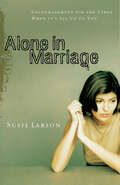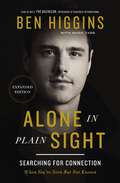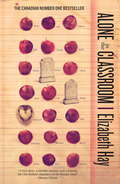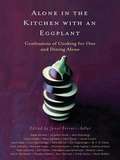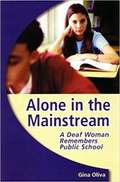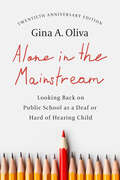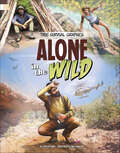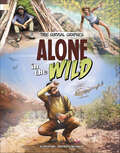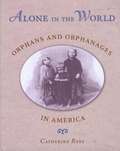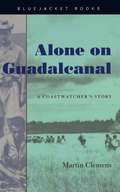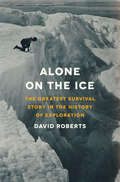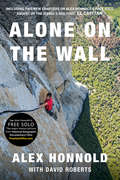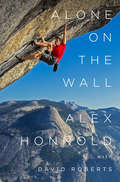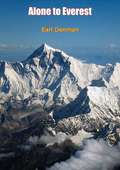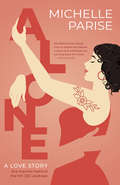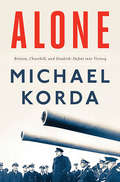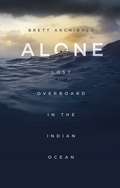- Table View
- List View
Alone in Marriage: Encouragement for the Times When It's All Up to You
by Susie LarsonBooks abound for those whose marriages are crumbling or have ended. But what about those marriages committed "'til death do us part" and yet are going through a period of time when one spouse is carrying the burden? What happens to a woman when marriage gets heavy and she gets weary? Often, when a woman ends up carrying the weight of the marriage (due to her husband's health, choices, workload, etc.), her tendency is to "get out or check out." She may consider her husband's distraction an opportunity to do her own thing. But is there a better way to walk through this season? Even thrive?Susie Larson stands in as an encouraging friend, walking with you, helping you to discern how anxiety and anger will slow you down; and how loneliness and disappointment can actually refine and bless you. You will be challenged and inspired as you wrap your arms around this time and remember that God has His arms around you.
Alone in Plain Sight Expanded Edition: Searching for Connection When You're Seen but Not Known
by Ben HigginsAre you tired of people knowing who you are but no one really knowing you?As the star of the twentieth season of The Bachelor, Ben Higgins looked like he had it all together. Instead, Ben felt dissatisfied, fearful, and deeply alone. Like so many of us, he thought of himself as the kid who never got picked for the game, the person always on the outside of the joke, the friend who knew a lot of people but was never truly known. He wondered if he mattered at all.In this expanded edition of Alone in Plain Sight, Ben shares with inspiring vulnerability how he found the deeper connection he longed for. He offers insight onhow to understand ourselves more deeply so that we are free to connect with others;how shared pain can bridge even the widest gaps between two very different people;how marriage and fatherhood have shaped his understanding of vulnerability and connection;how the God who longs for relationship with us is the answer to our need for connection; andin an all-new chapter, how radical generosity, service, and community building can lead to an even greater depth of relationship. In a disconnected world, it is possible to have lasting purpose and peace. You are already known. You are already loved. You are already seen. Discover how to live out how much you matter as you embrace the true meaning of your one incredible life.
Alone in the Classroom
by Elizabeth HayIn a small prairie school in 1929, Connie Flood helps a backward student, Michael Graves, learn how to read. Observing them and darkening their lives is the principal, Parley Burns, whose strange behaviour culminates in an attack so disturbing its repercussions continue to the present day. Connie's niece, Anne, tells the story. Impelled by curiosity about her dynamic, adventurous aunt and her more conventional mother, she revisits Connie's past and her mother's broken childhood. In the process she unravels the enigma of Parley Burns and the mysterious, and unrelated, deaths of two young girls.
Alone in the Classroom
by Elizabeth HayIn a small prairie school in 1929, Connie Flood helps a backward student, Michael Graves, learn how to read. Observing them and darkening their lives is the principal, Parley Burns, whose strange behaviour culminates in an attack so disturbing its repercussions continue to the present day. Connie's niece, Anne, tells the story. Impelled by curiosity about her dynamic, adventurous aunt and her more conventional mother, she revisits Connie's past and her mother's broken childhood. In the process she unravels the enigma of Parley Burns and the mysterious, and unrelated, deaths of two young girls.
Alone in the Jungle (Fountas & Pinnell LLI Gold #Level Q)
by Alice Cary<p>Lost in the Rainforest <p>After a plane crash, seventeen-year-old Juliane Koepcke found herself alone in the middle of the South American jungle. She had nothing but the dress she was wearing, one shoe, and a few pieces of candy. Could she possibly survive? <p> <p>Text Elements: <p> <p>Genre: Narrative Nonfiction <p>Text Structures: Main: Chronological Sequence Embedded: Description, Problem/Solution <p>Text Features: table of contents, headings, photos, captions, pronunciation guide, sidebars, map, labels</p>
Alone in the Kitchen with an Eggplant
by Jenni Ferrari-AdlerIn this delightful and much buzzed-about essay collection, 26 food writers like Nora Ephron, Laurie Colwin, Jami Attenberg, Ann Patchett, and M. F. K. Fisher invite readers into their kitchens to reflect on the secret meals and recipes for one person that they relish when no one else is looking. Part solace, part celebration, part handbook, Alone in the Kitchen with an Eggplant offers a wealth of company, inspiration, and humor--and finally, solo recipes in these essays about food that require no division or subtraction, for readers of Gabrielle Hamilton's Blood, Bones & Butter and Tamar Adler's The Everlasting Meal. Featuring essays by: Steve Almond, Jonathan Ames, Jami Attenberg, Laura Calder, Mary Cantwell, Dan Chaon, Laurie Colwin, Laura Dave, Courtney Eldridge, Nora Ephron, Erin Ergenbright, M. F. K. Fisher, Colin Harrison, Marcella Hazan, Amanda Hesser, Holly Hughes, Jeremy Jackson, Rosa Jurjevics, Ben Karlin, Rattawut Lapcharoensap, Beverly Lowry, Haruki Murakami, Phoebe Nobles, Ann Patchett, Anneli Rufus and Paula Wolfert.
Alone in the Mainstream: A Deaf Woman Remembers Public School (Gallaudet New Deaf Lives #1)
by Gina A. OlivaWhen Gina Oliva first went to school in 1955, she didn’t know that she was “different.” If the kindergarten teacher played a tune on the piano to signal the next exercise, Oliva didn’t react because she couldn’t hear the music. So began her journey as a “solitary,” her term for being the only deaf child in the entire school. Gina felt alone because she couldn’t communicate easily with her classmates, but also because none of them had a hearing loss like hers. It wasn’t until years later at Gallaudet University that she discovered that she wasn’t alone and that her experience was common among mainstreamed deaf students. Alone in the Mainstream recounts Oliva’s story, as well as those of many other solitaries. In writing this important book, Oliva combined her personal experiences with responses from the Solitary Mainstream Project, a survey that she conducted of deaf and hard of hearing adults who attended public school. Oliva matched her findings with current research on deaf students in public schools and confirmed that hearing teachers are ill-prepared to teach deaf pupils, they don’t know much about hearing loss, and they frequently underestimate deaf children. The collected memories in Alone in the Mainstream add emotional weight to the conviction that students need to be able to communicate freely, and they also need peers to know they are not alone.
Alone in the Mainstream: Looking Back on Public School as a Deaf or Hard of Hearing Child (Deaf Lives #14)
by Gina A. OlivaIn 1975, federal legislation initiated drastic changes in the education of deaf and hard of hearing children. Public Law 94-142, later known as IDEA, proposed to provide the “Least Restrictive Environment” for all such children. In the years since, advocates for deaf and hard of hearing children have raised the alarm that mainstream educational settings can cause language and social deprivation for these children. In Alone in the Mainstream, author Gina A. Oliva documents her experience as a “solitaire,” the only deaf or hard of hearing student in her school. Oliva felt alone because she couldn’t communicate easily with her classmates and because she had no peers who shared a similar experience. As an adult, when she began her career at Gallaudet University, she realized that she wasn’t alone and that her experience was widely shared with other mainstreamed students. She decided to write about this commonality and invited other solitaires to reflect on their own experiences in emails and essays. Collective themes of isolation, low expectations, and low self-esteem emerged. Alone in the Mainstream blends Oliva’s personal narrative with the reflections of sixty other solitaires and makes the case that deaf and hard of hearing children need each other. This twentieth anniversary edition is a reminder that little has changed for deaf and hard of hearing students in public school settings. Oliva brings this new edition up to date with observations, resources, and discussion questions that accompany her appeal for all deaf and hard of hearing children and their families to have access to sign language, to develop a deaf identity, and to be part of a deaf community.
Alone in the Mirror: Twins in Therapy
by Barbara KleinAlone in the Mirror: Twins in Therapy chronicles the triumphs and struggles of twins as they separate from one another and find their individuality in a world of non twins. The text is grounded in issues of attachment and intimacy, and is highlighted by Dr. Barbara Klein’s scholarly research, clinical experiences with twins in therapy, and her own identity struggles as a twin, all of which allow her to present insights into the rare, complicated, and misunderstood twin identity. She presents psychologically-focused real life histories, which demonstrate how childhood experiences shape the twin attachment and individual development, and she describes implications for twins in therapy, their therapists, and parents of twins. Unique to this book are effective therapeutic practices, developed specifically for twins, and designed to raise the consciousness of parents as well. Readers will find these practices and the insights within invaluable, whether they use them to communicate with twin patients, family members, or if they are part of a twinship themselves.
Alone in the Wild
by Jarred LujánA cyclist wanders away from his bike in Australia’s Great Sandy Desert. A fisherman loses his way in the Sierra Nevada mountains. A camper falls off a cliff in Mount Hood National Forest. These remarkable true tales could have ended in tragedy—but they didn’t! What happened to three people who found themselves stuck in the wilderness? And how did they survive to tell their tales? Young readers will find out in this easy-to-read hi-lo graphic novel that will keep them on the edge of their seats!
Alone in the Wild (True Survival Graphics)
by Jarred LujánA cyclist wanders away from his bike in Australia&’s Great Sandy Desert. A fisherman loses his way in the Sierra Nevada mountains. A camper falls off a cliff in Mount Hood National Forest. These remarkable true tales could have ended in tragedy—but they didn&’t! What happened to three people who found themselves stuck in the wilderness? And how did they survive to tell their tales? Young readers will find out in this easy-to-read hi-lo graphic novel that will keep them on the edge of their seats!
Alone in the Wild (True Survival Graphics)
by Jarred LujánA cyclist wanders away from his bike in Australia&’s Great Sandy Desert. A fisherman loses his way in the Sierra Nevada mountains. A camper falls off a cliff in Mount Hood National Forest. These remarkable true tales could have ended in tragedy—but they didn&’t! What happened to three people who found themselves stuck in the wilderness? And how did they survive to tell their tales? Young readers will find out in this easy-to-read hi-lo graphic novel that will keep them on the edge of their seats!
Alone in the Woods: Cheryl Strayed, My Daughter, and Me
by Micah PerksWhat do you do when fate hands you a wild daughter? As Micah recounts her struggles to raise a brave daughter and to keep her safe at the same time, she also tells the story of her own sometimes humorous, sometimes harrowing two-week solo adventure in the Adirondack Mountains as a teenager. Micah Perks’ candid short memoir takes an insightful look at women and the wild, the wildness she experienced as a child on a commune in the Adirondack wilderness, the ways women and wildness are depicted in movies and books like Cheryl Strayed’s best-selling memoir Wild, and the wilderness she discovers inside her own daughter.
Alone in the World (Orphans And Orphanages In America)
by Catherine ReefWho hasn't wondered what it would be like to grow up in an orphanage? What was the food like? Where did the children sleep? Were the caregivers kind or cruel? How did one end up in an orphanage in the first place?
Alone on Guadalcanal
by Martin W. ClemensThis remarkable memoir tells the compelling story of the near-mythic British district officer who helped shape the first great Allied counteroffensive. Scottish-born and Cambridge-educated, Martin Clemens managed to survive months behind Japanese lines in one of the most unfriendly climates and terrains in the world. After countless partisan and spy missions, in 1942 he emerged from the jungle and integrated his Melanesian commando force into the heart of the 1st Marine Division's operations, earning the unfettered admiration of such legendary Marine officers as Vandegrift, Thomas, Twining, Edson, and Pate. The book is based on a journal Clemens kept during the war and might well be the last critical source of analysis of the Solomon's campaign. His eyewitness accounts of harrowing long-distance patrols and life on the run from shadowy Japanese intelligence operatives and treacherous islanders are unmatched in the literature of the Pacific War. First published in 1998, the story is essential and enjoyable reading.
Alone on the Ice: The Greatest Survival Story in the History of Exploration
by David Roberts"An important missing story from the heroic age of Antarctic exploration."--Laurence Gonzales, author of Deep Survival On January 17, 1913, alone and near starvation, Douglas Mawson, leader of the Australasian Antarctic Expedition, was hauling a sledge to get back to base camp. The dogs were gone. Now Mawson himself plunged through a snow bridge, dangling over an abyss by the sledge harness. A line of poetry gave him the will to haul himself back to the surface. Mawson was sometimes reduced to crawling, and one night he discovered that the soles of his feet had completely detached from the flesh beneath. On February 8, when he staggered back to base, his features unrecognizably skeletal, the first teammate to reach him blurted out, "Which one are you?" This thrilling and almost unbelievable account establishes Mawson in his rightful place as one of the greatest polar explorers and expedition leaders. It is illustrated by a trove of Frank Hurley's famous Antarctic photographs, many never before published in the United States.
Alone on the Ocean (Fountas & Pinnell Classroom, Guided Reading)
by Catherine Friend Scott PlumbeNIMAC-sourced textbook. Stranded! Fisherman Ernie Hazard found himself all alone on the ocean in the middle of a gigantic storm. There was no one to help him survive, so he had to help himself.
Alone on the Wall (Expanded edition): Alex Honnold And The Ultimate Limits Of Adventure
by David Roberts Alex HonnoldIncluding two new chapters on Alex Honnold’s free solo ascent of the iconic 3,000-foot El Capitan in Yosemite National Park. On June 3rd, 2017, Alex Honnold became the first person to free solo Yosemite's El Capitan—to scale the wall without rope, a partner, or any protective gear—completing what was described as "the greatest feat of pure rock climbing in the history of the sport" (National Geographic) and "one of the great athletic feats of any kind, ever" (New York Times). Already one of the most famous adventure athletes in the world, Honnold has now been hailed as "the greatest climber of all time" (Vertical magazine). Alone on the Wall recounts the most astonishing achievements of Honnold’s extraordinary life and career, brimming with lessons on living fearlessly, taking risks, and maintaining focus even in the face of extreme danger. Now Honnold tells, for the first time and in his own words, the story of his 3 hours and 56 minutes on the sheer face of El Cap, which Outside called "the moon landing of free soloing…a generation-defining climb. Bad ass and beyond words…one of the pinnacle sporting moments of all time."
Alone on the Wall: Alex Honnold And The Ultimate Limits Of Adventure
by David Roberts Alex HonnoldThe life and death-defying feats of Alex Honnold, a visionary climber of the sort that comes along only once in a generation. Only a few years ago, Alex Honnold was little known beyond a small circle of hardcore climbers. Today, at the age of thirty, he is probably the most famous adventure athlete in the world. In that short time, he has proven his expertise in many styles of climbing and has shattered speed records, pioneered routes, and won awards within each discipline. More spectacularly still, he has pushed the most extreme and dangerous form of climbing far beyond the limits of what anyone thought was possible. Free soloing, Honnold's specialty, is a type of climbing performed without a rope, a partner, or hardware--such as pitons, nuts, or cams--for aid or protection. The results of climbing this way are breathtaking, but the stakes are ultimate: if you fall, you die. In Alone on the Wall, Honnold recounts the seven most astonishing climbing achievements so far in his meteoric and still-evolving career. He narrates the drama of each climb, along with reflective passages that illuminate the inner workings of his highly perceptive and discerning mind. We share in the jitters and excitements he feels waking in his van (where he lives full time) before a climb; we see him self-criticize in his climbing journal (a veritable bible for students of the sport); and we learn his secrets to managing fear--his most enviable talent. Veteran climber and award-winning author David Roberts writes part of each chapter in his own voice, and he calls on other climbers and the sport's storied past to put Alex's tremendous accomplishments in perspective. Whenever Honnold speaks in public, he is asked the same two questions: "Aren't you afraid you're going to die?" and "Why do you do this?" Alone on the Wall takes us around the world and through the highs and lows in the life of a climbing superstar to answer those fascinating questions. Honnold's extraordinary life, and his idiosyncratic worldview, have much to teach us about risk, reward, and the ability to maintain a singular focus, even in the face of extreme danger.
Alone to Everest
by Earl DenmanThe story of some of Earl Denman’s mountaineering exploits to Africa, culminating in his journey in 1947 through Tibet to Everest with Tenzing Norgay (later to become one of the first two individuals known to reach the summit of Mount Everest) is here told for the first time.Alone to Everest tells the remarkable story of a remarkable man. Among many present-day accounts of hardship and adventure, it stands out as the testimony of a man for whom modern civilisation and modern equipment mean little, and who is happiest, as he says, “walking barefoot on warm grass or wet rocks; in probing deep into cool, quiet forests; in days of healthy activity and evenings of restfulness spent beside a warming fire.” Denman’s achievements in the Belgian Congo—where with only local guides as companions he became one of the first men to climb all eight of the high and remove Virunga Mountains—made him realise that he would never rest until he had made a similar expedition to the highest mountain in the world. At the time £250 was all he had in the world; his equipment was of the simplest and cheapest. His journey by sea and land to Darjeeling was made under great difficulties. His meeting with Karma Paul, who introduced him to Tenzing and his friend Ang Dowa, was entirely fortuitous; he was expressly forbidden to enter Tibet (Nepal at that time was entirely closed to the Western world). Yet with all these handicaps he and the two Sherpas set off alone from Darjeeling, made their way, with many mishaps, through Sikkim and Tibet to the Rongbuk monastery, and thence to Everest itself. Appalling weather conditions finally drove them back, but not before they had attained a height of 23,500 feet.Everest has now been climbed, and no doubt will be again. But Denman’s feat, though superficially unsuccessful, remains a triumph against fantastic odds.
Alone: A Love Story
by Michelle PariseA memoir of falling in love, the fallout of infidelity, and everything messy in between — and the inspiration behind the hit CBC podcast. “Beautifully and powerfully written, Alone: A Love Story left me heartbroken and inspired at the same time.” — Terry Fallis “A lyrical tribute to the intoxicating, dramatic, destructive and ultimately empowering nature of love.” — Anna Maria Tremonti “Michelle Parise is the best company. Her passion and humour leap off the page.” — Camilla Gibb The church wedding, the new house, a beautiful baby … Michelle was sold a dream and bought into it. But one day, nine years in, she wakes up in an empty bed, and The Husband isn't there. Then, he drops The Bomb — he was having an affair with a woman at work. Adrift and on the edge of forty — fuelled by grief, booze, and one-night stands — Michelle battles the monster she calls Loneliness, juggling being a part-time parent and part-time partier. Though dangerously close to rock bottom, Michelle takes a chance on love again with a dashing but complicated man — The Man with the White Shirt. Michelle, an expert in "emotional forensics," dives into the wreckage with candour and humour, uncovering a story about falling in and out of love, divorce, single parenthood, and the messy world of dating. What she finds, beneath it all, is life and the courage to face it alone. “Michelle Parise knows how to shape and deliver a story that will keep you coming back for more.” — The Atlantic
Alone: A Widow's Search for Joy
by Katie F. WiebeKatie Wiebe's husband died of a rare disease, only two months after they moved to a new community, far from relatives. Katie was thirty-eight. She had to support her four children and her business skills were rusty. She was alone. This book is the story of how Katie Wiebe found strength to survive her loneliness and loss of identity, moving beyond widowhood into a new life, a new profession, and a new assurance that God wanted her to make a contribution to life.
Alone: Britain, Churchill, And Dunkirk: Defeat Into Victory
by Michael KordaCombining epic history with rich family stories, Michael Korda chronicles the outbreak of World War Two and the great events that led to Dunkirk. An epic of remarkable originality, Alone captures the heroism of World War II as movingly as any book in recent memory. Bringing to vivid life the world leaders, generals, and ordinary citizens who fought on both sides of the war, Michael Korda, the best-selling author of Clouds of Glory, chronicles the outbreak of hostilities, recalling as a prescient young boy the enveloping tension that defined pre-Blitz London, and then as a military historian the great events that would alter the course of the twentieth century. For indeed, May 1940 was a month like no other. The superior German war machine blazed into France, as the Maginot Line, supposedly "as firmly fixed in place as the Pyramids," crumbled in days. With the fall of Holland and Belgium, the imminent fall of Paris, the British Army stranded at Dunkirk, and Neville Chamberlain’s government in political freefall, Winston Churchill became prime minister on this historical nadir of May 10, 1941. Britain, diplomatically isolated, was suddenly the only nation with the courage and the resolve to defy Hitler. Against this vast historical canvas, Korda relates what happened and why. We first meet him at the age of six, surrounded by his glamorous movie family: his stage actress mother; his elegant father, Vincent, soon to receive an Academy Award; and his devoted Nanny Low, with whom he cites his evening prayers. Even the cheery BBC bulletins that Michael listened to every night could not mask the impending catastrophe, the German invasion so certain that the young boy, carrying his passport on a string around his neck, was evacuated to Canada on an ocean liner full of children. Such alarm was hardly exaggerated. No one, after all, could have ever imagined that the most unlikely flotilla of destroyers—Dutch barges, fishing boats, yachts, and even rowboats— would rescue over 300,000 men off the beach at Dunkirk and home to England. The miraculous return of the army was greeted with a renewed call for courage, and in the months that followed, the lives of tens of millions would be inexorably transformed, often tragically so, by these epochal weeks of May 1940. It is this pivotal turning point in world history that Korda captures with such immediacy in Alone, a work that triumphantly demonstrates that even the most calamitous defeats can become the most legendary victories.
Alone: Lost Overboard in the Indian Ocean
by Brett ArchibaldIn April 2013 a global breaking-news story surfaced on social media and in the world press, and rapidly gathered momentum. A South African man had fallen overboard in the night during a storm in remote Indonesian waters, without anyone else on board realising. Eight hours later a frantic search was underway. The incident caught the world's attention as readers were instantly transported into the terror of the moment - imagine being left alone, 100 kilometres out to sea in the middle of a storm, watching your friends sail into the distance... Had he been dealt a fraction more bad luck, Brett would have died immediately. According to the experts, he should have died within 10 to 14 hours. But he chose not to die. Instead for 28-and-a-half hours Brett Archibald endured - the ocean, the elements, the creatures of the deep, and his own inner demons. Alone: 28 Hours Alone in the Indian Oceanis the incredible but true story of what it takes to defy needle-in-a-haystack odds and survive what should have been certain death. Outdoor savvy, astonishing imagination, mental toughness, a refusal to give up hope and a canny rescuer with an unbelievable background ultimately saw him through. Most of all this is a story of the power of the human spirit that defies rational explanation.
Alone: Lost Overboard in the Indian Ocean
by Brett Archibald'That's what happened, I think, struggling to stay afloat as the ocean pummels me from all sides. I must have blacked out -- exhausted, dehydrated, even a little delirious -- and hit the water.And no one saw it happen.''When I heard Brett had fallen overboard, after twelve hours I said, "There's no way anyone can survive longer than that in the ocean - I certainly couldn't do it." This is an incredible, incredible story.'Oscar Chalupsky, Twelve times Molokai Paddleboard World ChampionIn April 2013, fifty-year-old Brett Archibald was on board a surf-charter boat, making a night-time crossing of the Mentawai Strait off Sumatra, Indonesia. In the middle of a storm, ill with severe food poisoning, Brett was being sick overboard when, for a moment, he blacked out. When he came to, he found himself alone in the raging sea, being spun as if in a washing machine. Sixty miles from shore, Brett saw the lights of his boat disappearing into the darkness. It was very quickly clear that no one had seen him fall, and that no one would hear his shouts for help. He was alone in the ocean. It would be eight hours before his friends realised he was missing. At that point a frantic search began, for a single man hopefully still alive somewhere in thousands of square miles of heaving waves. The Mentawai Strait is remote and the rough weather meant that no planes or helicopters could assist in the search.This is the remarkable story of Brett's ordeal, and his miraculous rescue after twenty-eight hours alone in the ocean; also of his family and friends back home and around the world and the Australian skipper whose sheer doggedness and instinct played such a key role in saving Brett.
